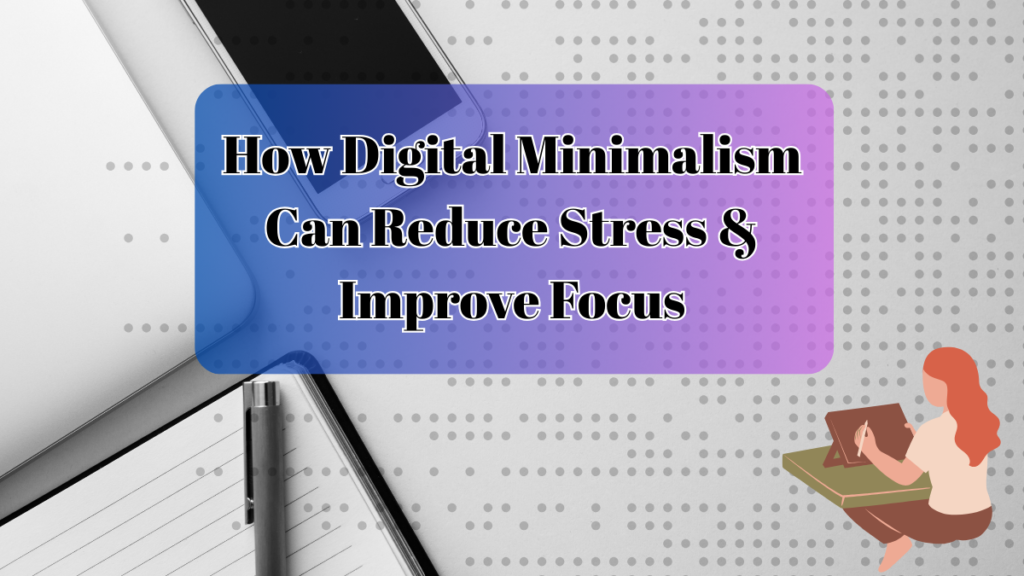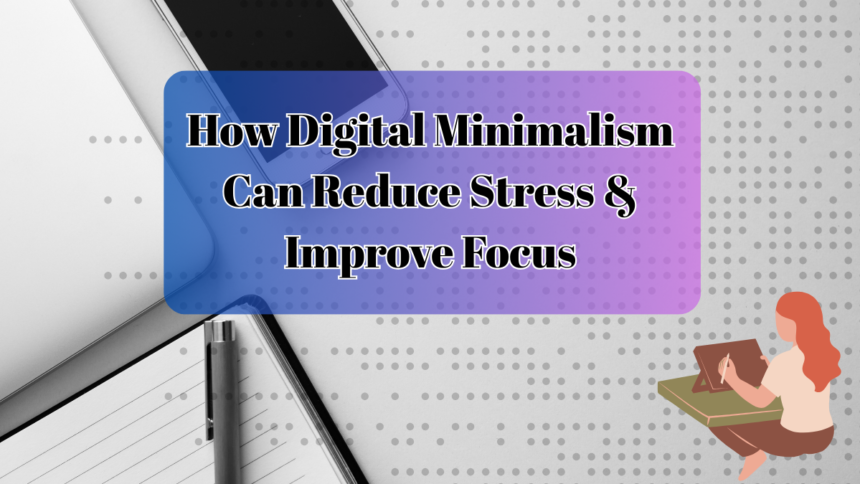Digital Minimalism
In today’s hyper-connected world, our lives are dominated by screens—smartphones, laptops, tablets, and smartwatches constantly demand our attention. Notifications buzz, emails pile up, and social media feeds never seem to end. While technology has made life more convenient, it has also contributed to rising stress levels, shorter attention spans, and a constant sense of overwhelm.
Enter digital minimalism—a mindful approach to technology that helps you reclaim focus, reduce stress, and live more intentionally. By cutting out digital clutter and prioritizing meaningful engagement, you can regain control over your time and mental well-being.
In this post, we’ll explore how digital minimalism can transform your life, along with practical tips to help you get started.

What Is Digital Minimalism?
Digital minimalism isn’t about rejecting technology entirely—it’s about using it with purpose. Coined by author and professor Cal Newport, digital minimalism is a philosophy that encourages:
- Intentional use of technology (only using apps and devices that add real value)
- Reducing mindless scrolling (cutting out unnecessary digital noise)
- Prioritizing real-life interactions (focusing on offline connections)
Think of it like decluttering your home, but for your digital life. Instead of drowning in endless distractions, you keep only what truly serves you.
How Digital Minimalism Reduces Stress
1. Less Information Overload = More Mental Clarity
Our brains weren’t designed to process the constant barrage of notifications, news, and social media updates. Studies show that excessive screen time increases cortisol (the stress hormone), leading to anxiety and burnout.
By practicing digital minimalism, you:
- Reduce decision fatigue (fewer apps = fewer choices)
- Avoid comparison traps (less social media = less FOMO)
- Create mental space for deep thinking and creativity
2. Fewer Distractions = Better Focus
Ever sat down to work, only to find yourself scrolling Instagram 10 minutes later? Digital minimalism helps you eliminate unnecessary distractions, so you can focus on what truly matters.
Research from the University of California Irvine found that it takes 23 minutes to regain focus after a single interruption. Imagine how much time you’d save by reducing digital distractions!
3. Improved Sleep & Well-Being
Late-night screen time disrupts melatonin production, making it harder to fall asleep. A Harvard Medical School study found that blue light from screens suppresses melatonin, leading to poor sleep quality.
By setting digital boundaries (like no screens an hour before bed), you’ll sleep better and wake up refreshed.
Practical Tips to Embrace Digital Minimalism
Video Credits
1. Audit Your Digital Habits
Start by tracking how much time you spend on your phone (use Screen Time on iOS or Digital Wellbeing on Android). Identify which apps drain your energy and which add value.
Action Step: Delete or limit time-wasting apps (social media, news, games).
2. Implement a “Digital Detox” Routine
Set designated times to check emails and social media—not first thing in the morning or right before bed. Try the 20-20-20 rule: Every 20 minutes, look at something 20 feet away for 20 seconds to reduce eye strain.
3. Turn Off Non-Essential Notifications
Most notifications are designed to hijack your attention. Disable all non-urgent alerts (especially from social media and news apps).
Pro Tip: Use Do Not Disturb mode during work or family time.
4. Declutter Your Digital Space
- Unsubscribe from unnecessary emails
- Organize files into folders
- Delete unused apps
- Use a minimalist phone wallpaper to reduce visual clutter
5. Schedule “Tech-Free” Time Daily
Whether it’s a morning walk, reading a book, or having a device-free dinner, dedicate at least 30-60 minutes daily to offline activities.
Final Thoughts: Reclaim Your Attention
Digital minimalism isn’t about deprivation—it’s about freedom. Freedom from endless distractions, from comparison traps, and from the stress of an always-on lifestyle.
By adopting even a few of these strategies, you’ll notice:
- Less stress and anxiety
- Sharper focus and productivity
- Better sleep and mental clarity
Your Next Step
Start small. Pick one habit to change this week—maybe turning off notifications or deleting a time-wasting app. Over time, these small shifts will lead to a calmer, more focused life.
What’s your biggest digital distraction? Share in the comments below!











